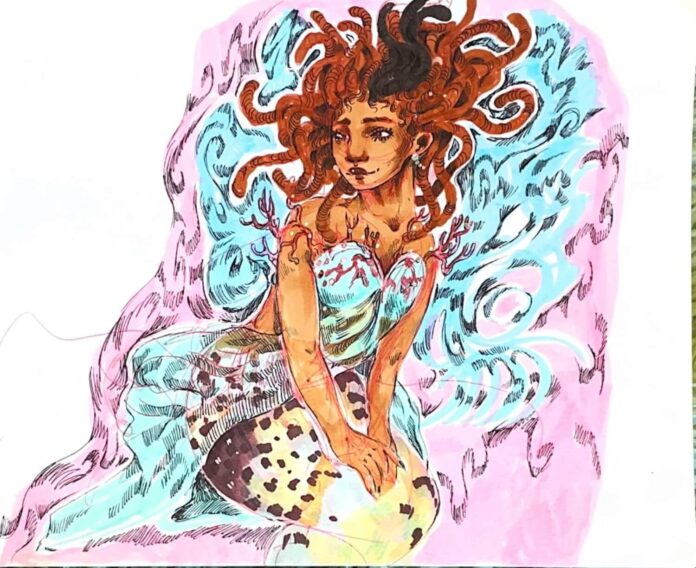If you were to ask me to select my current favorite of the Disney retellings I grew up with, I’d likely find myself unable to answer. I couldn’t tell you whether Mulan’s courage or Tiana’s determination moves me more, or whether I favor Hercules’ kind heart or Aladdin’s wit. As a child, however, caught up in lyrics I still remember word-for-word, the charm of an entire world hidden away beneath the sea with the promise of fantastical creatures who posses powers beyond my understanding, my answer would have undeniably been “The Little Mermaid.” I’m sure my mother has paraphernalia from my resulting mermaid obsession stored somewhere in the depths of our garage to prove it.
Over the years, Disney has released countless live-action remakes of these classic animated films, starting with “The Jungle Book” in 1994. Most recently, they released the trailer for a remake of the “The Little Mermaid,” starring singer and actress Halle Bailey in the titular role. While I’ve had misgivings about Disney’s past live-action films, I must admit to finding myself completely enraptured from the opening note of the new trailer. The sunken ship that Ariel scavenges for human treasure, the grotto that houses her innumerable trinkets, the gorgeously rendered flash of her tail and the accompaniment of Bailey’s voice are all unmistakable call backs to the original film with a unique, personal twist.
And yet, unsurprisingly, the movie and its main actress have been embroiled in internet controversy entirely unrelated to their yet unseen performance.
Bailey, a Black singer and actress with five Grammy nominations and a variety of acting roles under her belt, has the credentials to back up her casting. She and her sister Chloe have performed on stages such as the Grammys and the Superbowl, receiving praise from Beyoncé, who featured them in the film accompanying her album “Lemonade.” But critics have little interest in the repertoire that recommends Bailey for the role; they have more to say about her race.
Public outcry has poorly veiled its racism in claims that Bailey’s portrayal is unfaithful to Ariel’s original appearance, a white woman with starkly red hair. Online dissenters have gone so far as to use Artificial Intelligence to overlay Bailey’s features with that of a white woman amidst ridiculous complaints of “historical inaccuracy.” Amazon Studios’ new “Lord of the Rings” series has received similar backlash for choosing to cast Black and Asian actors that allegedly “ruin the immersion” for white fans and audiences. Just recently, 13 year-old Black actress Leah Sava Jeffries was cast in the role of Annabeth Chase for the upcoming “Percy Jackson” series, a character originally described as a blonde white girl, and was subject to absurd amounts of online abuse as a result.
There is a valid critique for the wave of live-action films Disney has been releasing. Animators for the original films have expressed that they are seeing a lack of originality and that the remakes lack the magic touch that their art brought to the stories. Disney is speculated to be marketing nostalgia by remastering their content for monetary gain and stifling creativity. The films themselves have received mixed reviews from fans and critics alike. None of this, however, detracts from the outpouring of racism that has followed the announcement of Bailey’s casting, nor can it be contextualized as an isolated instance.
Let’s not beat around the bush. The collective outcry is not a passionate defense against inauthentic representation; white actors have played characters and historical figures that are explicitly of color without a word of dissent from white audiences for years. In the same vein, diverse casting choices for characters originally represented as white or racially ambiguous have drawn controversy at every turn — take Amandla Stenberg’s casting as Rue in the “Hunger Games” or Idris Elba’s interest in playing James Bond. We’re not dealing with any real or founded controversy here. Actors of color, with a particular viciousness directed at Black actors, are once again on the receiving end of classic, textbook racism.
Representation in media is an ongoing fight, but it is one which has begun to bear fruit. Minorities can be presented as culturally authentic without stereotyping, while also occupying roles that don’t automatically center around their struggle. A Black mermaid can be regarded as just that; a citizen of Middle Earth, a demigod and a Hunger Games participant do not lose authenticity when portrayed as non-white. In this regard, the casting of Bailey should be celebrated. Movie casts are finally diversifying past the standard of whiteness and casting actors of color in roles that don’t sideline or stereotype them. Zendaya acted across Tom Holland’s Spider-Man in the iconic role of MJ. Dev Patel was cast as Sir Gawain in A24’s film adaptation of “Sir Gawain and the Green Knight.” People of color can finally relate to the experiences of characters we see on screen and have the simple pleasure of admiring a role in a fantastical setting filled by someone that shares our features and cultural background.
As I was growing up, white-centric media strongly affected the way I perceived myself and my cultural identity. In the very few places I saw my race reflected, it was always an ethnically stereotyped caricature in an inherently negative context. Personally, I was thrilled to hear about Bailey’s casting long before the trailer swept me off my feet. Every young child deserves to see themselves reflected in the media that shapes their childhood.
![]()































